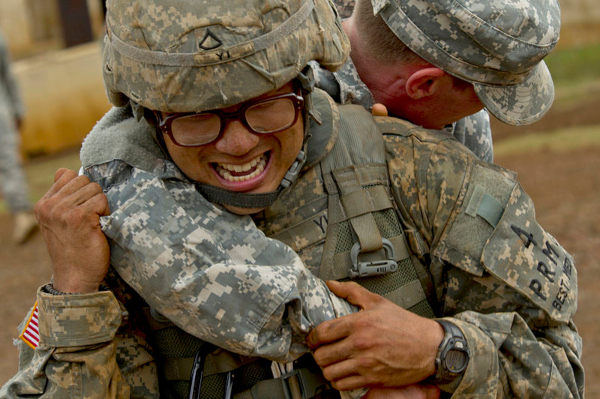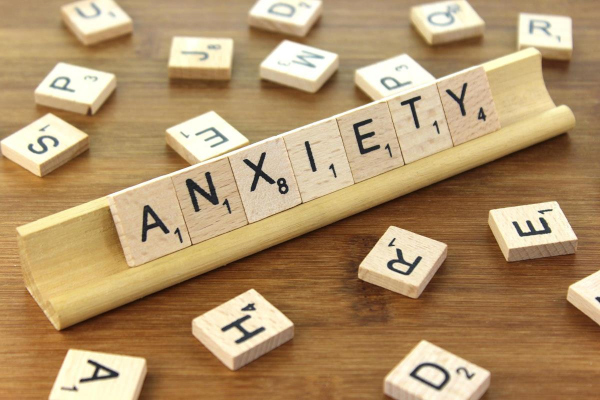Anxiety, despite how much we all hate it, is a part of life.
The emotion is present in every human being on the planet yet some individuals struggle more with anxiety than others.
Those that experience frequent or intolerable forms of anxiety, worry, or fear understand how difficult it is to enjoy a normal life while dealing with an anxiety disorder.
Even worse, most military personnel and veterans are at an increased risk of anxiety disorders and other mental health conditions from serving in wartime environments.
In this article, we will provide a brief review of the various anxiety disorders as well as how to file a claim for VA disability.
Related Article – Military Disqualifications for Mental Health
What is Anxiety?

Anxiety is an emotion, not a feeling.
There are countless emotions in the human body, some of which are considered more positive (joy, trust) while others have the potential to be damaging or life-altering (anger, fear).
While there are various forms of treatment for mental health conditions that target human emotions, the bottom line is we can only control the feelings and emotions our brain produces to a degree.
When we talk about anxiety, we are dealing with an emotion that is characterized by feelings of tension and worry.
Furthermore, anxiety disorders may contribute to not just mental and emotional changes, but physical changes like increased blood pressure.
There are several different types of anxiety disorders yet the consistent trend is that victims struggle to live a normal life because of recurring intrusive thoughts or concerns.
Consequently, patients that are diagnosed with anxiety disorders may avoid certain social situations out of worry or fear.
Anxiety disorders generally involve repeated episodes of sudden feelings of intense anxiety, worry, fear, or terror.
In certain situations, the victim may reach a peak within minutes that produce panic attacks.
Tragically, military veterans are more prone to anxiety disorders and other mental health conditions like PTSD because of their work environments.
Soldiers often encounter high levels of stress, worry, and fatigue, especially in wartime environments.
As a result, many veterans struggle with anxiety and therefore need some type of treatment to keep the condition manageable.
Symptoms of Anxiety Disorders
It is natural to experience occasional anxiety or worry.
However, when negative emotions begin to interfere with daily activities like work and family (and are difficult to control), you should consult a medical professional.
Victims of severe anxiety and panic disorders often feel like they have no escape from their suffering.
In many examples, the victim may avoid certain places or situations to prevent these negative feelings from arising.
Whenever these feelings are difficult to control, out of proportion to the actual danger, or frequently occur – it’s time to seek help.
Thankfully, there is a wide range of treatment options for patients that suffer from anxiety disorders.
The symptoms of severe anxiety may begin during childhood or teenage years.
Veterans often cite their time during service as the time in their life when anxiety levels became unmanageable.
The following symptoms are common:
- Feeling nervous, tense, or restless
- Increased heart rate
- Sense of impending danger, panic, or doom
- Rapid breathing (hyperventilation)
- Sweating
- Trembling
- Weakness
- Fatigue
- Trouble concentrating or thinking about anything other than worry
- Trouble sleeping
- Gastrointestinal (GI) problems
- Difficult controlling amount of worry
Those that suffer from anxiety disorders often have the urge to avoid certain situations that may trigger negative feelings.
Types of Anxiety Disorders
There are several different types of anxiety disorders.
It is possible to suffer from more than one anxiety disorder at the same time.
The best way to receive a diagnosis is to meet with a medical professional and discuss your symptoms.
Here is a few of the most common types of anxiety disorders:
- Agoraphobia: A medical condition where you avoid places or situations that cause you to panic.
- Generalized Anxiety Disorder: The most common form where the patient deals with persistent and excessive anxiety levels, even with ordinary, routine issues.
- Panic Disorder: The medical condition causes the patient to experience repeated episodes of sudden anxiety, fear, or terror that peak within minutes and produce panic attacks.
- Social Anxiety Disorder: Also known as social phobia, the person has trouble interacting in social situations and often avoids them to find relief from the negative emotions.
- Substance-Induced Anxiety Disorder: This type of anxiety disorder is common in adults that misuse drugs or alcohol. It can also result from abusing prescription medication or being exposed to toxic substances.
It is impossible to cover every type of anxiety disorder in this article.
There are many specific phobias that people deal with that contribute to high levels of anxiety or terror.
Additionally, you may suffer from an anxiety disorder that is a result of another medical condition.
Therefore, speaking with a medical professional and learning about the many forms of treatment is your first step toward getting healthy.
Additional Health Concerns
Anxiety disorders not only disrupt a normal and happy lifestyle but can also lead to additional health problems.
Unfortunately. the causes of anxiety disorders are not fully understood as doctors continue to learn about the complex human brain.
In military cases, life experiences such as traumatic events often trigger anxiety disorders, especially if you are already prone to this type of emotion.
Drugs and alcohol can also cause or worsen anxiety, most noteworthy during withdrawals.
Additionally, inherited genetic traits can play a factor in your levels of anxiety.
Stress is also counterproductive to anxiety which is why many medical professionals seek to reduce stress levels when confronting mental health conditions like anxiety disorders.
An anxiety disorder is often the first indicator of mental illness which can lead to the following conditions:
- Bowel Problems
- Chronic Pain
- Depression
- Headaches
- Insomnia
- Problems Functioning at School or Work
- Poor Quality of Life
- Social Isolation
- Substance Abuse
- Suicide
If you are suffering from high levels of stress, worry, or anxiety contact a medical professional immediately.
There are many forms of treatment for anxiety disorders and relief may be around the corner!
Related Article – VA Disability for Hearing Loss Guide
VA Disability Ratings Schedule for Anxiety for 2020

Veterans that have anxiety which is persistent and excessive, interfere with a normal life, and cause people to avoid certain situations suffer from an anxiety disorder.
Anxiety disorder diagnoses are rising in the military not only with veterans but among active-duty personnel.
In fact, the U.S. Armed Forces report that anxiety disorder diagnoses rose dramatically from 2005 to 2016.
The report also found that service members in the U.S. Army have the highest amount of anxiety disorder cases with more than 7% of active-duty personnel currently diagnosed.
For this reason, active-duty troops and veterans should seek VA disability for anxiety disorders.
These disability benefits can help cover treatment and other costs associated with mental health problems.
The Department of Veterans Affairs (VA) relies on the Diagnostic and Statistical Manual for Mental Disorders (DSM-5) to rate anxiety disorder conditions.
There is a unique set of criteria that determines whether the patient is suffering from an anxiety disorder.
VA Mental Health – Anxiety Disorders Rating Schedule
There are currently 6 different VA disability ratings for anxiety orders.
The rating you receive impacts the amount of disability (if any) you may receive for your medical condition:
0% Rating
The medical condition qualifies for a diagnosis of an anxiety disorder yet the symptoms are not severe enough to impair daily functionality.
Furthermore, the patient does not require medication to treat the anxiety disorder.
In this rating, the veteran is not eligible for any monthly VA disability compensation.
10% Rating
The 10% rating also indicates that anxiety or depression has been diagnosed yet the symptoms are mild.
While the veteran may experience short periods of high stress that results in minor social or occupational impairment, the condition is still not considered severe.
In this rating, the veteran will likely not receive much or any form of disability assistance.
30% Rating
The medical condition represents “mild symptomatology”.
In other words, there is an “occasional decrease” in work efficiency or inability to perform work tasks.
The patient may periodically miss work because of the mental health condition yet it doesn’t fully prevent them from completing tasks.
Additionally, the patient may occasionally isolate themselves yet are still able to maintain relationships.
Under this rating, the veteran may be entitled to some form of disability compensation yet nothing is guaranteed.
Higher Severity/Impairment
50% Rating
The medical condition at this rating acknowledges an escalation in the frequency, duration, and severity of the anxiety disorder(s).
Moreover, there are additional symptoms of the anxiety disorder present that are not found in lower VA disability ratings for mental health.
Signs of depression are often much more evident in a higher rating for anxiety disorders.
In this rating, the VA acknowledges that the anxiety disorder is starting to affect your normal functionality which is why you should receive at least partial benefits.
70% Rating
The medical condition is starting to become unmanageable in the 70% rating category.
For example, the patient may have trouble controlling their emotions which leads to violent outbursts and conflict.
Furthermore, the patient is almost always in a state of panic or depression that affects their ability to interact with others.
Those that receive a 70% rating may have the same symptoms as another patient in the 50% rating, yet the symptoms occur at a much higher frequency, duration, and severity.
In this rating, the veteran should receive a significant amount of compensation monthly from the VA.
100% Rating
Unfortunately, it is not easy to obtain a 100% VA rating for mental health.
The VA makes it mandatory that the symptoms are so severe that total impairment and functionality in everyday life is evident.
As a result, there must be evidence of a substantial decline in cognitive and emotional functioning that results in total impairment at school or work.
The patient may be too depressed to get out of bed or take a shower.
Furthermore, self-injuring behaviors and suicide attempts do qualify for the 100% rating.
While this rating is hard to obtain, it does provide full VA disability benefits to patients.
Related Article – Does Sleep Apnea Qualify as a VA Disability?
What are the Service Connections for Anxiety?

The Department of Veterans Affairs (VA) utilizes a rating schedule to determine the severity of an anxiety disorder, like all other medical conditions.
However, receiving a VA disability rating for your condition is only half the battle toward earning monthly disability compensation.
Veterans can only receive VA disability benefits for anxiety disorders by establishing a service connection:
- A current diagnosis of an anxiety disorder by a licensed VA clinic.
- An in-service occurrence that caused or aggravated the anxiety disorder.
- A medical nexus connecting the current, diagnosed anxiety disorder to the in-service occurrence.
In other words, you not only need an official medical diagnosis from a medical professional but also evidence that the anxiety disorder developed or worsened during your time in service.
It is not mandatory that service members have an official diagnosis of an anxiety disorder during service.
Rather, a veteran can get diagnosed with an anxiety disorder following service yet still receive disability as long as the current condition is connected to their time in service.
Nonetheless, a medical opinion is almost always needed to establish a medical nexus connection which is why meeting with VA medical professional is so important.
Secondary Service Connection
Those that are having trouble establishing a direct service connection have an alternative.
The secondary service connection is another way to build a medical nexus connection.
In a secondary service connection, the veteran already has a service-connected condition that has either A) caused the anxiety disorder or B) aggravated and made the anxiety disorder worse.
While this is an attractive option toward receiving VA disability benefits, you still need to develop a nexus connection that proves the already service-connected condition contributed to anxiety problems.
How to file a VA claim for Anxiety
The claims process for receiving VA disability benefits takes some time yet is more than worthwhile.
Disability compensation can help cover medical appointments and treatment associated with an anxiety disorder.
Follow these steps to file a VA claim for an anxiety disorder:
Step 1: Schedule a medical examination with a medical professional at an approved VA clinic or hospital.
Step 2: The doctor will examine you and study your symptoms to reach a diagnosis. Be honest about your symptoms to get a realistic diagnosis.
Step 3: The VA relies on the Diagnostic and Statistical Manual for Mental Disorders (DSM-5) to assign a VA disability rating. There are 6 different ratings (0%, 10%, 30%, 50%, 70%, 100%).
Step 4: Once you receive a VA disability rating you will understand the likelihood of receiving disability benefits. If your VA rating is higher (30 – 100%), consider filing a claim. You will need to establish an in-service connection.
Step 5: You can establish a direct service connection or attempt to establish one through a secondary basis. Either way, you must prove the medical condition started or worsened as the result of an in-service event.
Step 6: Once a medical opinion/diagnosis and service connection is established you have grounds for filing a disability claim. Provide as many medical records and evidence as possible to prove a medical nexus connection.
Step 7: Review the claim for errors and submit to the Department of Veterans Affairs. You should give them time to review the claim, but feel free to check in on the progress.
Note: The VA utilizes the same disability claim process for all forms of mental illness. Thus, you only need to submit one disability claim for mental health even if you suffer from anxiety and depression.
Frequently Asked Questions (FAQ)

Here are some frequently asked questions about VA disability for anxiety disorder claims:
NOTE: You can reach the Department of Veterans Affairs for more questions at 1-800-698-2411.
Related Article: 15 Best States For Military Retirees And Veterans
How much disability compensation will I receive for anxiety?
The amount you receive in monthly VA disability for anxiety disorders depends on the disability rating.
Those that receive a lower rating (0 – 30%) may or may not receive monthly disability compensation.
However, even those with a 0% rating for anxiety and depression still qualify for free VA health care which can assist with medical bills and treatment.
In general, those at a VA disability rating of 30% can expect around $430 per month while a 50% rating pays out much higher at $880 per month.
The highest levels of impairment (70 – 100%) offer substantial monthly compensation.
Veterans with a 70% VA rating for mental health receive $1,400 per month while the 100% rating provides over $3,000 per month in disability.
These rates are subject to change yet were accurate as of 2019.
What is the VA percentage for anxiety?
The department currently has 6 different VA ratings for mental health conditions.
Anxiety disorders are categorized along with the same rating system as other types of mental illness like depression and PTSD.
The VA rates anxiety disorders based on severity and level of impairment.
The 6 different percentage ratings in terms of severity (from lowest to highest):
- 0%
- 10%
- 30%
- 50%
- 70%
- 100%
The percentage rating of your condition affects the amount of monthly disability compensation.
The higher the rating, the more you’ll receive in monthly disability.
Is it possible to get 100% VA disability for anxiety?
Yes, it is possible to get a 100% VA rating for an anxiety disorder.
However, the Department of Veterans Affairs rarely assigns this degree of impairment.
The major exceptions are when the patient has become suicidal or is considering hurting others.
The 100% rating is difficult to obtain regarding mental health conditions because the VA requires that the symptoms are so severe they completely impair your ability to function in everyday life.
In these situations, the patient is often too impaired to carry out simple, normal daily functions like getting out of bed or taking care of personal hygiene.
What if my anxiety was aggravated by service?
It is common for service members and veterans to deal with mental health problems such as anxiety disorders.
The VA will only award disability benefits to service members that establish a service connection.
The service connection can either be direct or through a secondary basis.
Regardless, you must prove that the anxiety disorder started or worsened as a result of an in-service event.
For example, you may have had very minor anxiety prior to enlistment yet if that condition worsened as a result of serving in the military, you can establish a medical nexus with an official diagnosis.
What other benefits can I receive for anxiety?
There is a wide range of treatments available to tackle complex mental health problems like severe anxiety.
Prescription medications are helpful for some patients while others rely on service animals or another type of alternative treatment.
Mental health conditions are complex and often more than one form of treatment is recommended to address the issue.
We recommend that you meet with a medical professional immediately if you are suffering from anxiety or another mental health condition to get an expert opinion regarding treatment.
What can I do if my anxiety claim is denied?
If your VA disability claim was denied, do not panic!
It is common for some disability claims to get denied yet that doesn’t mean it is the end of the road.
Veterans are entitled to compensation for service-connected disabilities.
Therefore, you have the right to appeal the decision.
Some veterans prefer to hire a lawyer during the appeals process to improve their chances of success.
You can begin receiving monthly disability at a VA rating of 10% or higher.
Related Article – 20 Health Conditions That May Disqualify You From Military
Conclusion
It is common for veterans to develop anxiety disorders while serving the country or have symptoms worsen.
Soldiers confront many high-stress situations which can lead to damaging trauma.
Additionally, making the transition from military to civilian life is stressful and worrisome for many veterans.
As a result, anxiety and depression are often byproducts of serving in the U.S. Armed Forces.
Fortunately, there is relief available for those that choose to pursue help.
VA disability for anxiety disorders is available based on the severity and impairment of your mental health condition.
The first step is to get an official medical diagnosis followed by proving an in-service connection.
Those that receive a diagnosis get monthly compensation from the VA based on their mental health rating.
- Ikon Pass Military Discount: Learn How To Save Big - January 31, 2025
- RTIC Military Discount: Find Out How To Save Big on Gear - January 30, 2025
- Traeger Military Discount: Learn How To Save Big on Smokers - January 28, 2025


